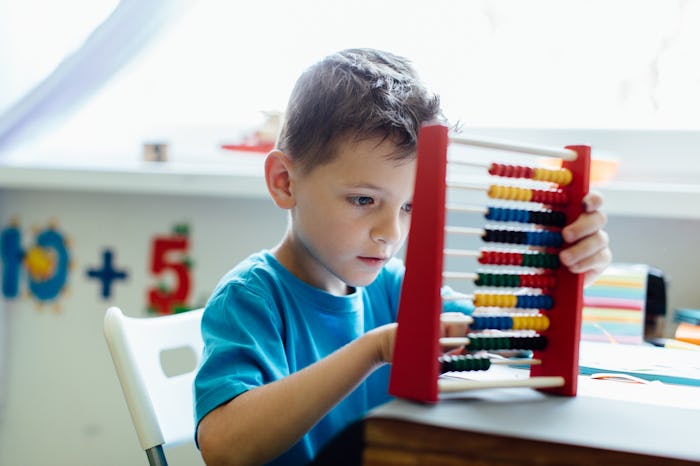Life

How Homeschooling Affects Your Kid Later, According To Experts
Yes, parenting brings with it a love you couldn't have possibly imagined, but it also ushers in something else: All the worry. Whether you cringe thinking about your kid who loves to take risks, or fretting over your child's future, the act of raising a human is no small feat. Of course, when it comes time to send them to school, you might already have your mind up. But for some parents, they are faced with the decision of public, private, or homeschooling. When it comes to the latter, they might worry about how homeschooling affects your kids later. But experts say the options for homeschooled kids have grown over the years, meaning the right plan can lead your kids toward a solid future.
"Homeschooling has changed so much over the decades," Barb Harvey, an early childhood expert and parenting coach, tells Romper in an email interview. "I think homeschool children get a lot from the experience and the most important is a good education."
Harvey, who is also the executive director of Parents, Teachers and Advocates, Inc., says an important aspect of learning is that children — homeschooled or traditionally schooled — understand it is not just about sitting in a classroom. "Homeschooling families tend to take family vacations around what their children are studying," she says, adding that, for example, a family might go to D.C. on vacation to see more directly how laws are made. "This gives kids the understanding that learning does not always take place in the classroom, but also as we live our lives."
John Edelson, founder of Time4Learning, an online homeschool curriculum for K-12, agrees with Harvey, adding: "Families choose alternative schooling options for a variety of reasons. Some families want a lifestyle that gives them more control over their time. It could be that they simply want more time with their children or the flexibility to pursue family interests such as traveling.”
Another benefit, Edelson tells Romper, is that homeschooling gives parents the ability to give their children an education based on their skill level. “If your child is a sixth grader, but excels at math, it’s easy to make seventh grade math lessons available to him or her."
According to KidsHealth, some of the main concerns that surround homeschooling involve access to school facilities, like a gymnasium, science lab, or art studio. Other parents worry about the potential social effects homeschooling might have on children. "All kids need to have friends and be around other children," the site noted. "Some homeschoolers may feel cut off from kids their age or feel like they spend too much time with their families."
Harvey says, however, that there is still some concern about how to help homeschooled kids with socialization. "There is a danger of kids becoming isolated," she says, "which could lead to poor social skills. However, kids who are in [homeschool] co-ops have all the same social outlets of regular school kids. They even have sports leagues which can lead to sports scholarships for some kids."
Other opportunities to socialize homeschooled kids include participating in local homeschool family get-togethers, volunteering at community organizations, and looking into local camps where they can meet other children, according to Homeschool.com.
"In most areas, it's not difficult to find social interaction," Camille DiMaio, author of the forthcoming The Way of Beauty and mom to four homeschooled kids, tells Romper. "Libraries are usually great resources for teen activities, as well as church groups, theater groups, and sports groups. Some public school districts will allow homeschoolers to participate in after-school activities — it's worth asking." DiMaio also recommends parents look at their local JCC, YMCA, YWCA, recreational centers, and other similar places for activity options.
"Hands-down, I think the main contributor to how school kids take into their future is being a self-starter and very independent thinker," Harvey says. "[In the case of homeschooled kids,] they often drive their own learning. If they are studying something which piques their interests, they have the time for them to explore that and lean more deeply about a topic or a certain aspect of that topic which is not available in general at a public institution."
Turns out the kids — homeschooled or not — really will be alright.
Check out Romper's new video series, Romper's Doula Diaries:
Watch full episodes of Romper's Doula Diaries on Facebook Watch.